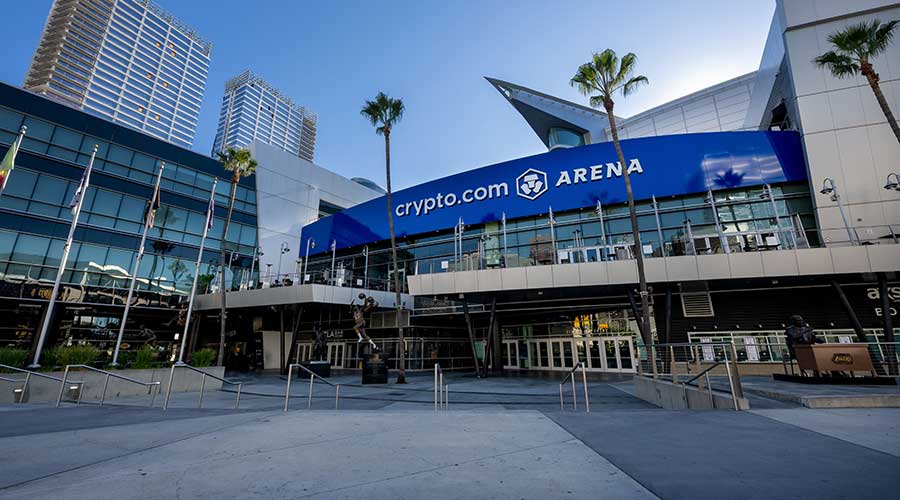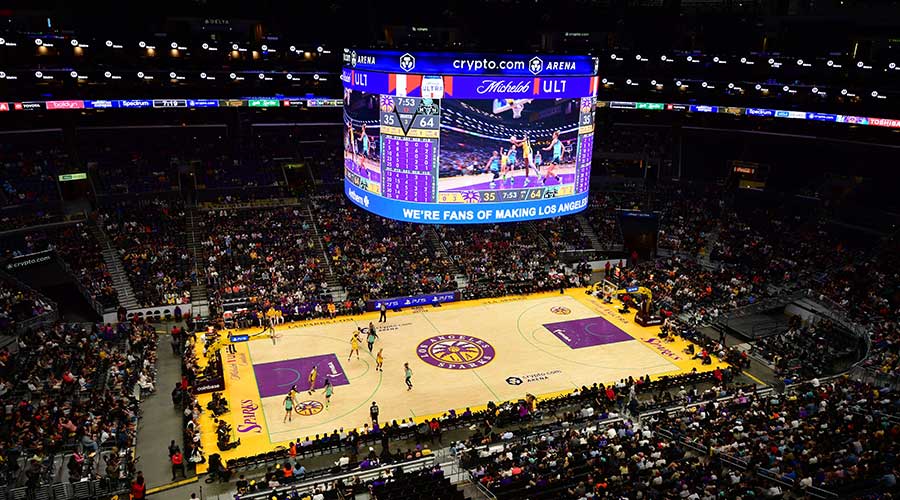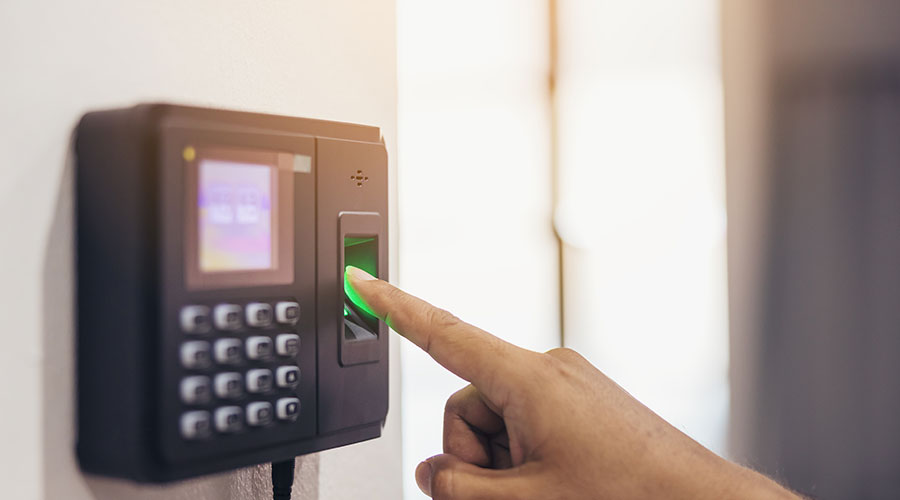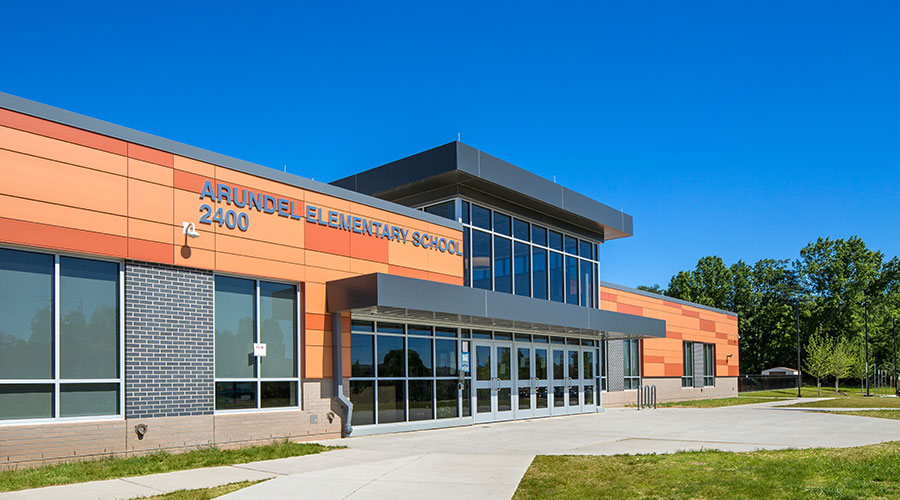 Crypto.com Arena
Crypto.com ArenaCrypto.com Arena Embraces Health and Safety to Lure Back Audiences
Crypto.com Arena embraced health and safety accreditation to address coronavirus concerns
By Dan Hounsell, Senior Editor
Officials in charge of the Crypto.com Arena in Los Angeles knew their situation was dire. COVID-19 had shut down arena operations in March 2020, and the facility was searching for a comeback strategy. The challenge was to take actions that would help the arena cope with new operational needs created by the disease, care for struggling workers and at the same time attract performers, event organizers and the general public back to the facility.
“We needed to do something,” says Ignacio Guerra, the arena’s senior vice president of operations and engineering. “We needed to start looking at how we get ourselves reopened again before people start to worry about their jobs and salaries.”
The ensuing months and years would see the facility emerge as one of the first performance venues to embrace health and safety certifications as a way to come back from the pandemic and return to solid operational footing.
Coming out of COVID
The pandemic had taken a heavy and immediate toll on the 950,000-square-foot arena — home to the Los Angeles Lakers, Los Angeles Kings and Los Angeles Sparks — as well as its staff.
“We shut down hard,” Guerra says. “COVID completely shut down our industry. We were one of the first industries to shut down and one of the last ones to come back up.”
The impact did not just affect the facility’s operations.
“Some people took COVID very hard,” he says. “As a company, we stayed in business, but we did lay off people. We did furlough people. We actually reduced salaries of some people. We went to 50 percent (salary) on quite a few of our staff.
“Some people were shuttered at home for an extended period of time. There was a big mental health impact, so we chose strategically to support mental health recovery and provide mental health benefits as a company.”
Looking for a reopening strategy, arena officials took note of two resources — the WELL Health-Safety Rating and the Global Biorisk Advisory Council (GBAC) program. The GBAC program offers accreditation based on cleaning and maintenance regimen for facilities that focuses on infection prevention, disinfection and building wellness.
“We looked at both” programs, Guerra says. “GBAC just came out of the gate a little faster, and we were desperate for something tangible that we could get our hands on to show people that we could receive guests. So we went the GBAC route. Around April, we put together a team that started to analyze all our procedures and policies.”
The decision to participate in GBAC in 2021 was based on the unique needs of a facility that needs to attract not just audiences but events and performers, all of whom were wary of activities and locations that might expose them to the disease.
“How do we make ourselves not just bulletproof against COVID but also tell a story to get people to want to come back into the building?” Guerra asks. “We went all in for GBAC. We spent a couple really tough months just going for it. In July, us and the (Miami) Dolphins’ stadium were the first two big arenas and stadiums to announce GBAC.” Soon, events that included the Emmys, a Mike Tyson boxing match and professional basketball and hockey games followed suit back to the arena.

Transition considerations
Crypto.com Arena renewed its GBAC accreditation in 2021, but officials were looking to expand their efforts to ensure a safe, healthy facility.
In November 2020, the International WELL Building Institute (IWBI), which oversees the WELL Health-Safety Rating certification, had partnered with GBAC, and Crypto.com Arena began its pursuit of WELL certification. Informed by the WELL Building Standard, the WELL Health-Safety Rating is a roadmap for driving resilience across business policies and operational plans. The seal communicates that a venue is maintaining effective and up-to-date practices for safety and wellness. To achieve the rating, facilities must meet requirements related to operational policies, maintenance protocols and emergency plans.
“The (WELL) health and safety rating can show our staff that we're just as committed to them as we are to the guests,” Guerra says. “GBAC is more for guests and forward facing, WELL is more for the staff.”
Why did Crypto.com Arena decide to pursue WELL certification instead of staying with GBAC?
“Because we were GBAC certified, they gave us credit for the first five elements” of the WELL rating, Guerra says. “So we have the first five. We know how to document. We know how to how to put together policies and procedures to match the requirements. What’s the uplift to go and get WELL?
“At that time, things were getting a little stagnant. Everybody was just aching to get back to work. COVID was still happening, and we were having trouble getting the staff to come back to work, so we were looking for the next step.”
That step was WELL.
“We had a reentry plan, but it was for COVID, and to be honest with you, we were in shock from COVID,” he says. “We didn’t want to think about COVID anymore, and I didn’t want to go through the reentry process. So we did emergency procedures instead. There were lots of options and menus that we could have picked from. We ended up with 18 achievements that got us our certification” from WELL in 2023.
Spotlight on sustainability
The decision to pursue the WELL health-safety rating also enabled Crypto.com Arena officials to focus on an area of operations that had been heavily impacted by changes due to the pandemic — sustainability.
“Sustainability was one that got hit,” Guerra says, adding that the organization hired Nelson Ventress as sustainability program manager for Crypto.com Arena, Peacock Theater and L.A. Live, a 4-million square-foot entertainment facility. “Nelson came on board, and we worked tirelessly. We were able to match up a lot of things. Besides the five elements that GBAC gave us, we actually had quite a few of the others because they were just building best practices.
“We got some credits for innovations because we switched everything out to MERV 13 air filters, which also met a lot of the California requirements. It’s also what people were doing in the industry, and our system could handle it. It was a little bit more costly, but we weren’t so much concerned with that. We were more concerned with doing the right thing. Because we had practice with the documentation, we ended up getting our certification with the WELL health-safety rating for the arena.”
The organization decided to renew the certification by expanding it to adjoining spaces — the Peacock Theater and the executive offices of AEG, which owns L.A. Live.

“I took on all the responsibility of coordinating all the documentation and asking the departments for the requirements for the certification — asking for emergency action plans, asking for information on health benefits for our employees,” Ventress says. “Were there any differences between the employees of the arena and the employees of the executive arm, which is where my department sits? That was one of the challenges — understanding the specific language within those health benefits and how it affected different tiers of employees and getting HR to approve us to share the documentation with IWBI.”
The renewal process presented Ventress with a daunting challenge.
“Going to our L.A. Live management team, asking them for the same documentation, found that not a lot of the documentation has been kept up to date,” Ventress says. “We had to go back internally, review those documents, update them and make sure that they are still relevant to today’s climate cause.”
In early 2025, Crypto.com Arena, along with the Peacock Theater and AEG offices at L.A. Live, earned the WELL Health-Safety Rating. The arena earned the certification for a second consecutive year.
“A lot of what the WELL was asking for, like a healthy reentry plan, was specific to COVID,” Ventress says. “We do have COVID language within our healthy reentry plan, but we need to update it for other emergencies, such as wildfires and earthquakes and even rarities like tornadoes and hurricanes.”
The certification challenges will continue for Ventress and Guerra. The city of Los Angeles will host the 2028 Summer Olympics, with the Crypto.com Arena as one of the event’s high-profile performance spaces. To ensure the facility meets the demands of event organizers, Guerra says the arena will pursue certification under ISO 20121:2024 for event sustainability management systems.
“We always do things looking ahead, and we know that we have the L.A. 2028 Olympics in our sites,” Guerra says. “The rumbling is that the baseline for that is going to be ISO 20121, so we want to be ready to go there. We don’t want to be waiting until the summer ‘28 to go get this.” The standard addresses sustainable event management, guiding organizations to integrate sustainability into event planning and execution. This standard applies to events of all types and sizes, encouraging organizations to manage social, economic and environmental impacts responsibly.
“Our next certification is going to be easier because we are now experts coming through and out of GBAC, coming through the WELL health and safety rating, and going into this ISO certification,” Guerra says. “Our processes and procedures couldn’t be better. Documentation makes us much better, more efficient. We’re also becoming a better building to be able to take care of our guests and entertainers and talent.
“That’s the proudest thing — that we can be at the top of our game in this industry with top-notch teams that document and are nimble enough to be able to add to the repertoire. They can handle whatever future events are coming. And we know some big events are coming our way.”
Dan Hounsell is senior editor for the facilities market. He has more than 30 years of experience writing about facilities maintenance, engineering and management.
Related Topics:














